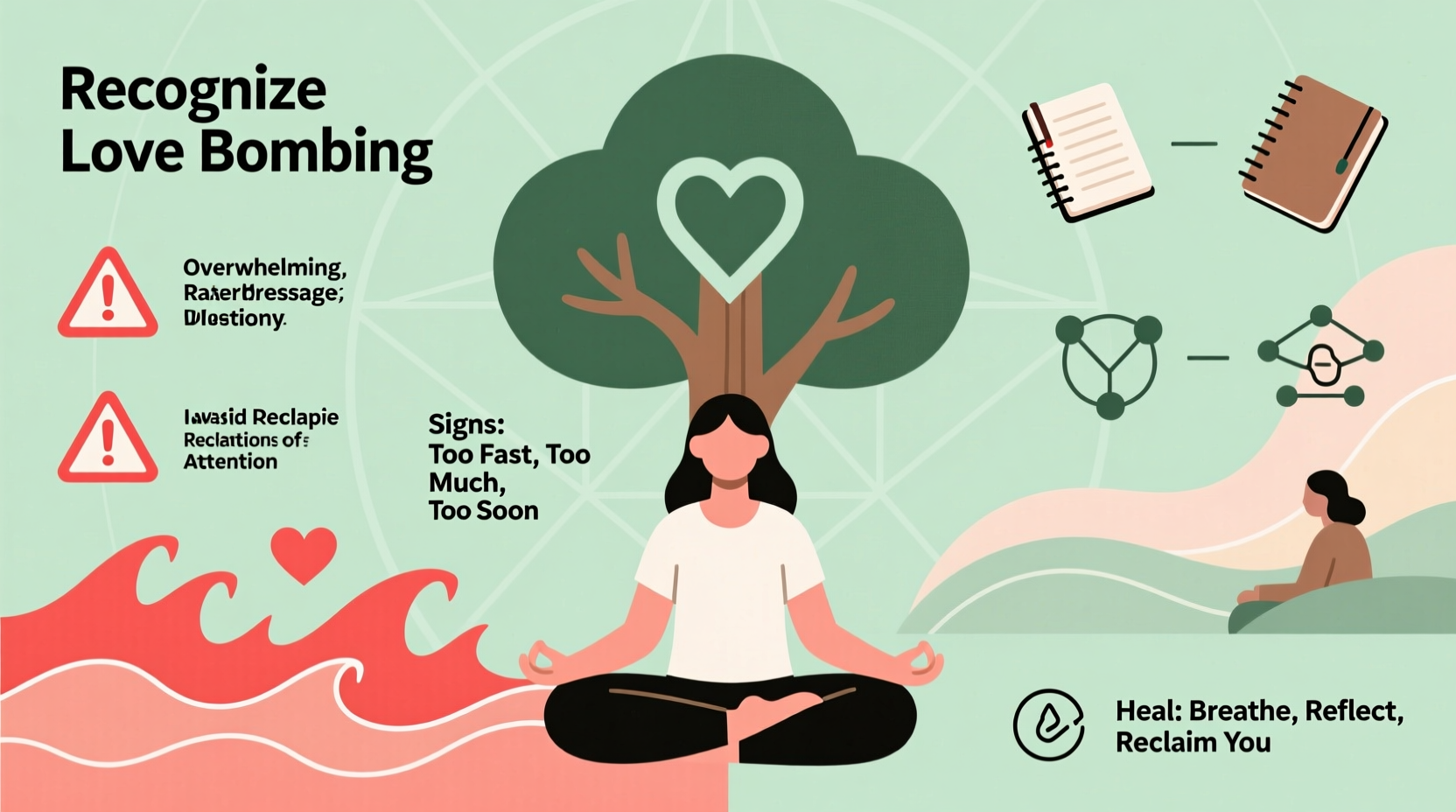Love should feel safe, consistent, and respectful. But sometimes, what appears to be overwhelming affection at the start of a relationship is actually a manipulation tactic known as love bombing. This intense display of affection, attention, and flattery may seem flattering at first, but it often masks control, dependency, and emotional abuse. Recognizing the signs early and knowing how to respond can mean the difference between healing and long-term emotional harm.
Understanding Love Bombing: More Than Just Fast-Forward Romance

Love bombing refers to a pattern where one person overwhelms another with excessive praise, affection, gifts, and future-faking—talking about marriage, children, or lifelong commitment very early in the relationship. While some people are naturally passionate or expressive, love bombing goes beyond enthusiasm. It’s characterized by intensity that feels disproportionate to the stage of the relationship.
The goal is not genuine intimacy but to create emotional dependency quickly. The love bomber seeks to disarm boundaries, accelerate attachment, and gain influence over their target. Once trust and dependence are established, they may begin to withdraw affection, criticize, or manipulate—creating a cycle of highs and lows that keeps the victim emotionally entangled.
“Love bombing isn’t about love—it’s about power. It’s a tool used to destabilize someone’s sense of reality so they become easier to control.” — Dr. Lila Torres, Clinical Psychologist and Author of *Emotional Boundaries*
Red Flags: How to Spot Love Bombing Early
Because love bombing often mimics ideal romantic behavior, it can be difficult to identify—especially if you’ve longed for deep connection or have experienced loneliness. However, certain patterns distinguish healthy passion from manipulative overload:
- Instant declarations of love: Saying “I love you” within days or even hours of meeting.
- Over-the-top gestures: Lavish gifts, surprise trips, or dramatic public displays without knowing your preferences.
- Future-faking: Planning a life together—homes, pets, vacations—before establishing mutual values.
- Constant contact: Texting every few minutes, calling repeatedly if you don’t respond immediately.
- Isolation attempts: Subtly discouraging time with friends or family, framing it as “we don’t need anyone else.”
- Emotional mirroring: Mirroring your beliefs, interests, and speech patterns unnaturally fast to create false rapport.
What Happens After the Bomb: The Crash and Control Phase
Love bombing rarely lasts. After the initial high, many perpetrators shift into devaluation—criticizing, withdrawing affection, or introducing guilt and obligation. This contrast creates confusion. You may find yourself trying harder to regain the warmth and attention you once received, mistaking neglect for a test of loyalty.
This cycle follows a predictable arc:
- Admiration phase: Intense focus, adoration, idealization.
- Devaluation phase: Criticism, coldness, blame for their changing mood.
- Discard phase: Sudden breakup or threat of abandonment.
- Hoovering: Returning with more love bombing to re-engage you.
Each loop erodes self-trust. Victims often internalize the problem: “Maybe I wasn’t loving enough,” or “If I had listened more, they wouldn’t have pulled away.” But the issue isn’t your worth—it’s the manipulator’s inability to sustain healthy intimacy.
Mini Case Study: Maya’s Experience
Maya met Daniel on a dating app. Within two weeks, he told her she was “the love of his life,” flew her to a weekend getaway, and spoke constantly about moving in together. He memorized her favorite songs, quoted her childhood stories back to her, and called her daily. Three weeks in, he canceled plans last minute, then accused her of “needing too much attention” when she expressed concern. Over time, compliments turned into critiques. He said she was “too sensitive” when she questioned his secrecy. It took months for Maya to realize she hadn’t been cherished—she’d been targeted.
Healing From Love Bombing: A Step-by-Step Recovery Plan
Recovery begins with validation. What you experienced was real, and your emotions are legitimate—even if the relationship wasn’t built on truth. Healing requires both insight and action.
Step 1: Name the Behavior
Call it what it is: emotional manipulation. Avoid minimizing phrases like “I overreacted” or “It wasn’t that bad.” Acknowledge the impact. Journaling can help clarify distorted memories.
Step 2: Cut Contact (If Possible)
Going no-contact breaks the cycle of intermittent reinforcement—the psychological hook that makes abusive dynamics so hard to leave. Block or mute them across platforms to reduce temptation.
Step 3: Reconnect With Reality
Talk to trusted friends or a therapist. Manipulators often isolate their targets and distort facts. Outside perspectives restore objectivity. Ask: Did this person support my growth—or demand compliance?
Step 4: Rebuild Self-Trust
Practice listening to your gut. Reflect on moments you ignored discomfort. Write down your core values in relationships: respect, honesty, consistency. Use them as a compass moving forward.
Step 5: Set Emotional Boundaries
Start small. Say no to requests that feel intrusive. Allow new connections to develop slowly. Healthy love grows steadily—it doesn’t explode overnight.
Do’s and Don’ts: Navigating New Relationships Safely
| Do | Don’t |
|---|---|
| Allow time for trust to build naturally | Rush into labels or commitments under pressure |
| Notice consistency between words and actions | Ignore red flags because “they’re going through a lot” |
| Maintain your social circle and routines | Let someone convince you that “we only need each other” |
| Ask questions about past relationships and conflict resolution | Accept vague answers or deflection when seeking clarity |
| Trust gradual vulnerability | Fall for instant “soulmate” narratives that bypass real knowing |
FAQ: Common Questions About Love Bombing
Can love bombing happen in friendships or family relationships?
Yes. While commonly associated with romantic partners, love bombing can occur in any relationship where control is the goal. A friend might suddenly offer endless support, then use it as leverage. A family member may shower you with affection after years of neglect to manipulate decisions. The pattern—intense investment followed by demands or withdrawal—is the same.
Is love bombing always intentional?
Not always. Some individuals with borderline personality disorder (BPD) or narcissistic traits engage in love bombing unconsciously, driven by fear of abandonment or a need for validation. Regardless of intent, the impact on the recipient is similar. Safety and boundaries remain essential.
How do I know if I’m vulnerable to love bombing?
People who have experienced past trauma, low self-worth, or prolonged loneliness may be more susceptible. So are those raised in environments where love was conditional. Healing these underlying wounds reduces vulnerability. Therapy, journaling, and supportive communities help rebuild secure attachment.
Conclusion: Reclaim Your Emotional Autonomy
Recognizing love bombing isn’t about becoming cynical—it’s about becoming clear. True connection doesn’t require dazzling performances or emotional whiplash. It thrives in quiet consistency, mutual respect, and the freedom to be imperfect.
If you’ve been through this, understand: you were not foolish. You were targeted. And healing isn’t just possible—it’s yours. Start by honoring your experience, setting firm boundaries, and choosing relationships that grow at a human pace. You deserve love that steadies you, not one that shakes your foundation.









 浙公网安备
33010002000092号
浙公网安备
33010002000092号 浙B2-20120091-4
浙B2-20120091-4
Comments
No comments yet. Why don't you start the discussion?